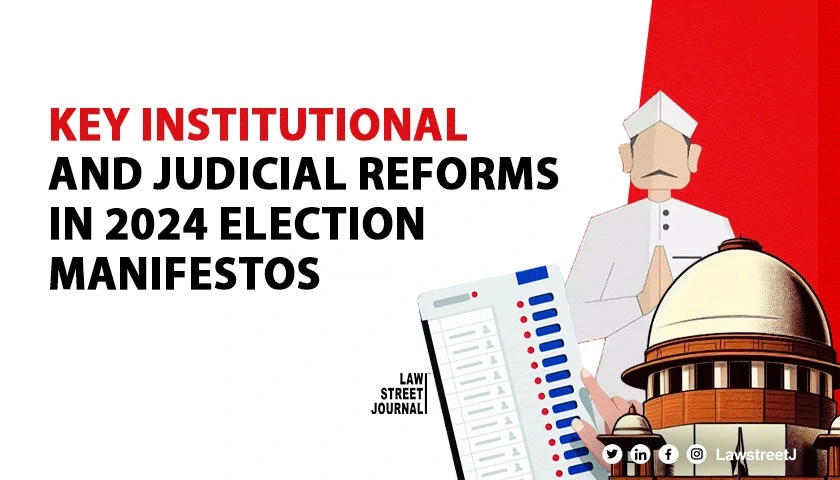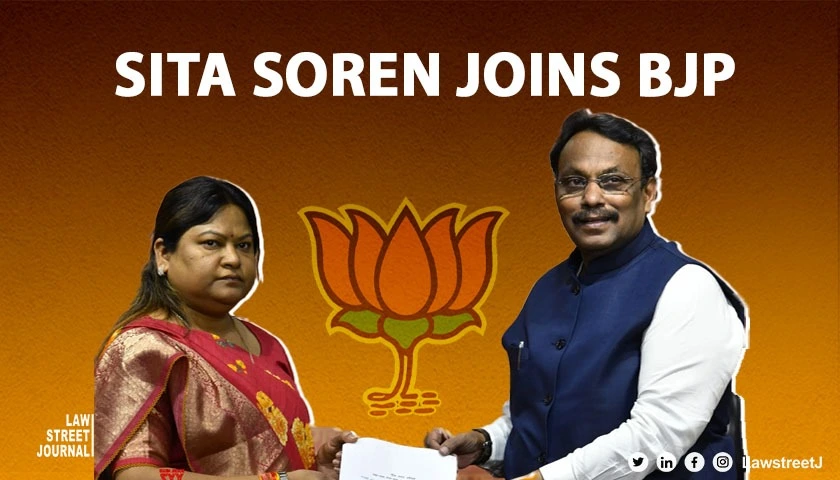NEW DELHI: Bharat is a home to more than 144 crore people, and has already begun the exercise of conducting the Lok Sabha elections on 19 April. In a mammoth exercise, and what can be stated to be an unprecedented scale of parliamentary elections with the worlds largest electorate of nearly 97 crore eligible voters, the nation ensures that even those in the remotest corners are able to exercise their right to vote.
In the ongoing electoral cycle for 2024 Lok Sabha Elections, various national parties have released their election manifestos attempting to attract the minds and capture the imaginations of the voters to their promises and vision for governance of the nation for the next 5 years.
Here are certain key institutional and judicial reforms promised by two national parties - the Bharatiya Janata Party and Indian National Congress.
BJP: Reform, Perform & Transform
The Bharatiya Janata Party released its manifesto for the 2024 Lok Sabha polls. In its section on Modi ki Guarantee for Good Governance, the incumbent party in power has reiterated that Reform, Perform, Transform is its mantra for Good Governance.
The BJP states its vision for good governance is to further simplify the processes, procedures, rules and regulations in a manner that they are able to take the government out of the everyday lives of citizens. It also promises to undertake more institutional reforms and simplify processes using technology to ensure that citizen-government interaction is significantly improved.
The party promises to continue its fight against corruption through strict implementation of laws and use of technology. As regards personal laws, while mentioning Article 44 of the Constitution (Directive Principles of State Policy), the manifesto states that that there cannot be gender equality till such time Bharat adopts a Uniform Civil Code, which protects the rights of all women. BJP reiterates its stand to draw a Uniform Civil Code, drawing upon the best traditions and harmonising them with the modern times.
As regards institutions, the BJP promises to strengthen statistical institutions for data-driven policy-making, stimulate fiscal autonomy and sustainability of Panchayati Raj institutions and to improve public services delivery through CSCs and Post Offices using technology in multiple languages, and to increase public participation in policy making.
On the judicial reforms, the BJP promises to accelerate the e-Courts Project on mission mode to complete the digitisation of entire court records and for easy access to court proceedings online. In addition, they also promise to create a better legal framework to promote arbitration and mediation ecosystem.
The BJP also promises to expedite the resolution of old cases by establishing fast track courts for quick disposal of pendency in identified areas. The manifesto also states that they will formulate a National Litigation Policy to expedite the resolution of all matters in courts, lower the cost of court proceedings, and decrease the number of cases in which the government is a party and the consequent load on the courts.
While promising Reforms in the Civil Procedures, the BJP has stated that it will overhaul the commercial and civil justice systems, on the lines of criminal justice reforms. This revamp will aim to streamline procedures, enhance the efficiency of legal processes and ensure timely justice, fostering a more business-friendly and citizen-centric legal environment.
Congress: Saving Democracy, Removing Fear, Restoring Freedom
In its Nyaya Patra, the Indian National Congress has enlisted various policies and promises they seek to fulfil should they be voted into power. In its section titled Defending the Constitution, the manifesto states that all anti-people laws passed by the BJP/NDA without proper parliamentary scrutiny and debate, especially those relating to workers, farmers, criminal justice, environment & forests and digital data protection, will be thoroughly reviewed and changed.
It also promises to carry out complete investigations of the Electoral Bonds Scam, the reckless sale of public assets, the PM CARES scam, repeated intelligence failures at the highest levels and corruption in major defence deals.
Congress promises to restore freedom of speech and expression including full freedom of the media, and to de-criminalise the offence of defamation and to review various laws including Telecommunications Act, 2023, and all laws that interfere with the right to privacy.
While rejecting one nation one election idea, the Congress promises to combine the efficiency of the EVM with the transparency of the VVPAT. It also promises to amend the Tenth Schedule of the Constitution to make defection an automatic disqualification of the membership in the Assembly or Parliament.
The Congress states that it will ensure that the police, investigation and intelligence agencies will function strictly in accordance with law. They promise to end the weaponization of laws, arbitrary searches, seizures and attachments, arrests, third-degree methods, prolonged custody, custodial deaths, and bulldozer justice. It also promises a law on bail to incorporate the principle that bail is the rule, jail is the exception in all criminal laws. Additionally, it promises a comprehensive prison reform to transform jails into institutions of rehabilitation, reform and correction.
It promises to strengthen the autonomy of the Election Commission of India, the Central Information Commission, the Human Rights Commission, the CAG, the Commissions for SC, ST, minorities and OBC, and other constitutional bodies.
On the judicial reforms, the manifesto envisions a National Judicial Commission (NJC) to be formed in consultation with the Supreme Court, for the appointment of judges to the Supreme Court and the High Courts. The manifesto commits to filling up all vacancies in the Supreme Court and High Courts within three years.
It also promises a constitutional amendment to create two divisions of the Supreme Court. One division will comprise the seven senior most judges to hear Constitution Bench matters and the second division will hear routine appeals. The manifesto also promises to allocate funds to augment the physical and technical infrastructure for the modernisation and maintenance of the infrastructure of the judiciary. Additionally, it also promises to increase the representation of women and persons belonging to the SC, ST, OBC and minorities in the higher judiciary.
Congress also intends to set-up a Judicial Complaints Commission as a body comprising retired judges of the Supreme Court and retired Chief Justices of the High Courts to investigate complaints of misconduct against judges of the higher judiciary.
Aditya Kashyap is an advocate practising at the Supreme Court of India.









